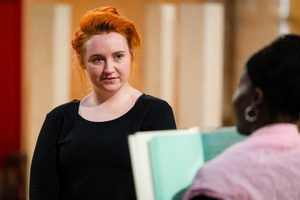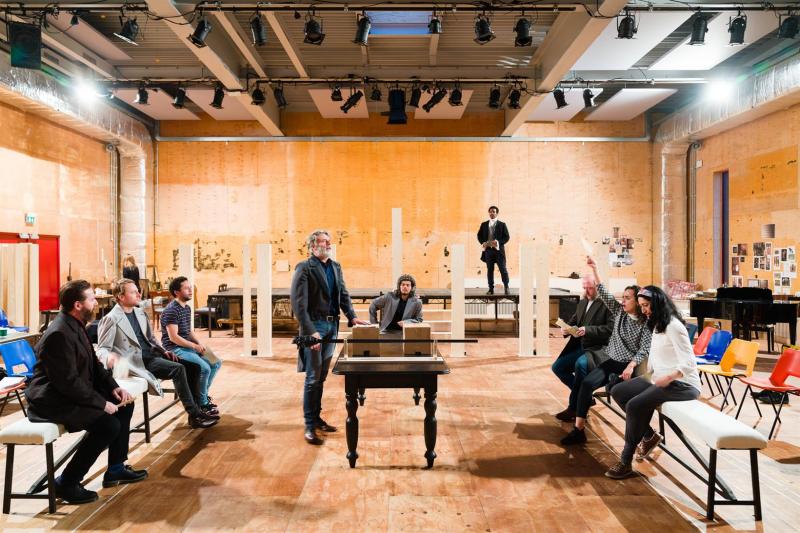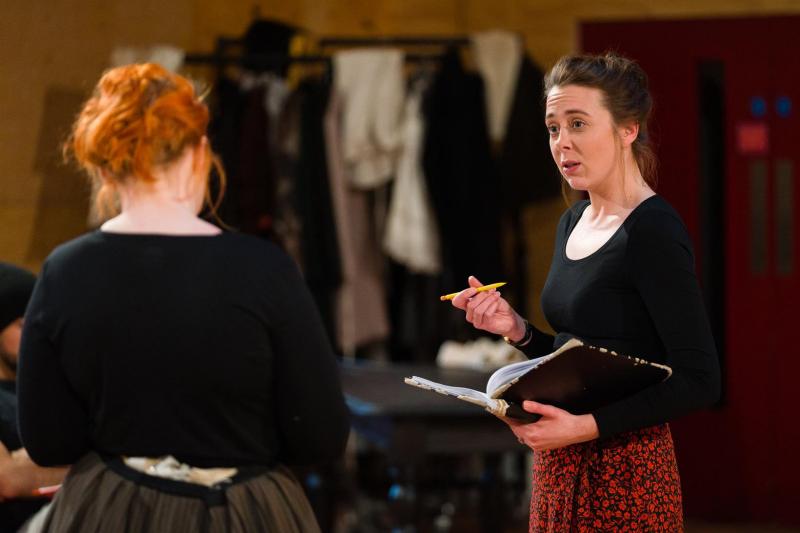Interview: Katherine Pearce Talks THE WHIP

for The Whip
Actress Katherine Pearce makes her Royal Shakespeare Company debut this season, featuring in both King John and The Whip.
A new play by Juliet Gilkes Romero, the play explores when personal, political and private worlds collide. Katherine takes us through what it's like to join the company, and how the play speaks to today.
What was your earliest memory of theatre?
The first theatre I saw was a production of Oliver! at the Palace Theatre in Manchester. From then, I joined St John's drama group (my debut!)
I was the Wicked Witch of the West and I just loved it so much. Whenever I went to pantomimes with the school, I always wanted to play the baddies rather than the princesses, I thought they were so much cooler.
And what was your first experience at the RSC? Was it as a child too?
Oh God... how is this going to look?! I hadn't seen anything by the RSC before this season!
I grew up quite far away from Stratford, so we didn't do a trip or anything. And because I trained in Wales, it was too far to come to do a trip with drama school. But I'd always known about the RSC and wanted to be a part of it, because of the legacy they have and the actors that have trained here.
So the first thing I saw was Venice Preserved when I started rehearsing here! And I was like, "Oh my God! Look at the size of the stage!" And The Boy in the Dress was the first thing I saw in the RST. But I'm really glad it happened that way, because I think it would have put more pressure on my audition and more pressure on me being here.
.jpg)
Bridgitta Roy in rehearsals
for The Whip
What's it like being a first timer at the RSC?
The building is so welcoming, everybody is so kind. From the people who work on the front desk, to the people who work in the cafe, everybody is so excited to be involved.
And you are a company. One of my first jobs was Secret Theatre at the Lyric Hammersmith, which was a company that ended up lasting 2 and 1/2 years. And I feel like the more you know people, the longer you're in the same room, the better the work is.
You have a shorthand with everybody you've learned from the first play, so by the time you get to the third play, everyone's a bit braver and a bit bolder to test people.
So over the three plays here (A Museum in Baghdad, King John and now The Whip), most of us are all the same - and some of us are in some, but not in the other. So I'm not in A Museum in Baghdad, whereas I am in King John.
Take us through making your RSC debut in King John.
So I don't mind saying this: I auditioned for King John and I auditioned for the Bastard, and I wasn't right for either of them. And thank god because I think it would have been a lot of responsibility on top of Horatia (which I'd auditioned for first).
So then they asked me to come in and read for Pandulph. And when I read it I was like, "Oh my God, what am I supposed to do with this?!" Because obviously he's a cardinal, it's a him, he's in his 60's, all very churchy, very flowery and I had no idea.
And because I am quite young and I am Northern, I'm not any of those things that a cardinal is "supposed" to be. And thank goodness for Eleanor [Rhode, Director] giving me the idea, along with an email being like, "I think I see it more a family drama - so maybe try seeing her more as the family lawyer". And she also encouraged me to use my own accent, because your first instinct is to go dead posh or Italian!
So I came up with this thing where she comes up at the end of all sentences, and she was quite unassuming. So because she turned out to be quite the villain of the piece, I thought it would be good to play her as completely unassuming and quite innocent.
And because of who I am and where I come from, I never really get a chance to play those parts where I get to wear a beautiful costume and all the make up and a big wig. It's not really my casting bracket. So I was so thrilled to be playing someone cruel and manipulative, because that is not usually what I get to do - such an amazing challenge.
And to do that on a platform like the RSC to go, "I know it's usually played like this, but what about this?" It's daunting but so thrilling to be like, "Yeah, well what do you think about this!" Challenging those audiences, it felt really rebellious.
And now you're in a new play: The Whip. Can you give us a bit of a background to the play?
The Whip follows four central characters including Lord Boyd. He is an MP and at the start of the play his priority is The Factory Bill, which was to reduce the hours of child labour in cotton mills in 1833.
But then he gets pulled in a different direction with the Slavery Abolition Bill coming through, which was incredibly important. And he's trying to get all of this done in a moral way, but is influenced by all kinds of powers that be: money, the Tory party etc.
And it's a real ensemble piece. There are so many storylines going on that feed into this, and it's about all of the decisions that had to be made so that that happened.

Did you know much about the history?
I didn't at all, actually. I lived in Manchester, so I was aware of the history of cotton and the factories that came with it and the awful conditions. Coming from there, it's hard to get away from that history because the fight of the working classes is something that has been with me throughout my entire life.
But I wan't fully aware of just how much the Government has pitted things against each other, which is very clearly illustrated in the play. They really do pit the Slavery Abolition Bill against the Factory Bill, which is basically putting Black British people against the white working classes.
And this is something that happens all the time, even now. We are taught to see each other as enemies rather than coming together and understanding that both sets of suffering have commonality.
Also there's modern history too. So the play was inspired by a tweet by the Government that basically said, "Congratulations, this year we paid off the International Abolition Slavery Compensation debt". And that was the tax payer paying compensation to the companies that had to give up their slaves, because slavery was abolished... which is absolute madness when you think about it.
I had no idea my taxes every year were paying off a compensation debt to slavery, did you?! I was so shocked. Billions of pounds... I just can't get my head around it.
How does your character figure into this world?
So Horatia is coming from a completely different walk of life to Boyd. I've walked from Blackburn to London after the death of my child to get the law changed for the Factory Bill, which is what Boyd was about to begin to tackle.
But there's this theme of women not being listened to and having to do everything sort of in secret. It's interesting, the minute I put that bonnet on in the rehearsal room to be Horatia, she sort of talks about it as an invisibility cloak because it is true. Women at that time were not seen and not listened to.
And there are these two amazing women who want to change it in the play: Horatia and Mercy. The character of Mercy is very much a feminist and is aware of the fight for equality, whereas Horatia comes at it like she's instinctively feminist, but isn't intellectually feminist at all. She's aware that she gets treated very differently but doesn't quite understand why.
There's a lot of times that Horatia is outworded - they use these huge, big words in order to bamboozle her and stop her from understanding and getting involved in the conversations. And that happens all the time now, where there's an attitude towards the working classes that they will not understand if we do it this way. I mean look at the benefits system: it's used tactically to be confusing, it's done on purpose.

Kimberley Sykes
in rehearsals a??a??a??for The Whip
What's it been like working on new writing and how does it speak to today?
I think it's really current, it speaks to feminism, racism and classicism. And for it to be written by a Black British woman who is descended from slaves, it's such a triumph.
And the rehearsal room that Kimberley Sykes has created is so wonderful. She's created such a kind space. And that's the thing of working with new writing: you really do need open minds and open hearts in order to get through it.
Because as much as you want it to be the right draft when you enter the room, that's not always the case. And our writer Juliet Gilkes Romero and Kim are so good at being like, "I think that bit doesn't work. Let's try this bit". And the actors she's curated are very open and willing to do that.
We all love the story so much that we want to get it right. So that means that room that Kim has created is all about the message of the play and we have to do whatever we need to do to make sure it is told correctly and everyone is on board with that. And that's a massive thing for a director to do, to go, "It's not about all of you, it's not about me, it's not about Juliet. It's about the story."
The Whip at the RSC's Swan Theatre, 1 February - 21 March
Photo credit: Steve Tanner
Comments

Videos

